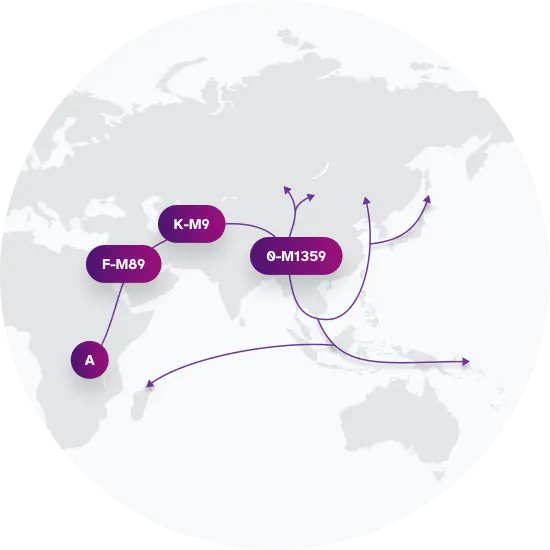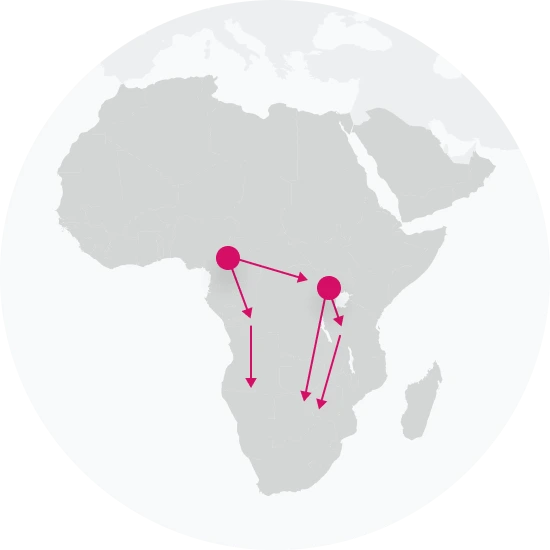Explore the Family Name Abdi
How common is the last name Abdi in the United States?
Based on the Decennial U.S. Census data, the surname Abdi saw an increase in popularity from 2000 to 2010. In 2000, it was ranked 13,364 in terms of frequency but by 2010, it climbed significantly to the rank of 4,738. That's a notable change of 64.55%. The count of individuals with this surname also surged from 2,091 in 2000 to 7,484 in 2010, an impressive increase of 257.91%. Moreover, the proportion per 100,000 people rose from 0.78 to 2.54, marking a considerable upturn of 225.64%.
| 2000 | 2010 | Change | |
|---|---|---|---|
| Rank | #13,364 | #4,738 | 64.55% |
| Count | 2,091 | 7,484 | 257.91% |
| Proportion per 100k | 0.78 | 2.54 | 225.64% |
Race and Ethnicity of people with the last name Abdi
The ethnic identity associated with the surname Abdi also underwent changes between 2000 and 2010, according to the Decennial U.S. Census data. In 2000, 61.74% of those with the surname identified as Black, and this increased to 89.70% in 2010, reflecting a growth of 45.29%. Meanwhile, the percentage identifying as Asian/Pacific Islander decreased from 2.92% to 2.00%, and those identifying as White diminished from 11.19% to 5.09%. The data also shows a significant decrease in those identifying with two or more races; it dropped from 23.34% to 2.65%. Notably, there were new representations in 2010: 0.47% identified as Hispanic and 0.09% as American Indian and Alaskan Native.
| 2000 | 2010 | Change | |
|---|---|---|---|
| Black | 61.74% | 89.7% | 45.29% |
| White | 11.19% | 5.09% | -54.51% |
| Two or More Races | 23.34% | 2.65% | -88.65% |
| Asian/Pacific Islander | 2.92% | 2% | -31.51% |
| Hispanic | 0% | 0.47% | 0% |
| American Indian and Alaskan Native | 0% | 0.09% | 0% |
Abdi ancestry composition
23andMe computes an ancestry breakdown for each customer. People may have ancestry from just one population or they may have ancestry from several populations. The most commonly-observed ancestry found in people with the surname Abdi is Somali, which comprises 66.7% of all ancestry found in people with the surname. The next two most common ancestries are Iranian, Caucasian & Mesopotamian (13.9%) and Ethiopian & Eritrean (4.1%). Additional ancestries include British & Irish, Northern Indian & Pakistani, French & German, Angolan & Congolese, and Southern East African.
Ready to learn more about your ancestry? Get the most comprehensive ancestry breakdown on the market by taking our DNA test. Shop 23andMe
| ANCESTRY BREAKDOWN | COMPOSITION |
|---|---|
| Somali | 66.7% |
| Iranian, Caucasian & Mesopotamian | 13.9% |
| Ethiopian & Eritrean | 4.1% |
| Other | 15.3% |

Possible origins of the surname Abdi
Your DNA provides clues about where your recent ancestors may have lived. Having many distant relatives in the same location suggests that you may all share common ancestry there. Locations with many distant relatives can also be places where people have migrated recently, such as large cities. If a large number of individuals who share your surname have distant relatives in a specific area, it could indicate a connection between your surname and that location, stemming from either recent ancestral ties or migration.
Based on 23andMe data, people with last name Abdi have recent ancestry locations spanning a few countries, mostly in Somalia, and Iran.
| RECENT ANCESTRY Location | Percentage |
|---|---|
| Banaadir, Somalia | 74.70% |
| Mudug, Somalia | 74.70% |
| Bari, Somalia | 72.00% |
| Galguduud, Somalia | 70.70% |
| Nugal, Somalia | 61.30% |
What Abdi haplogroups can tell you
Haplogroups are genetic population groups that share a common ancestor on either your paternal or maternal line. These paternal and maternal haplogroups shed light on your genetic ancestry and help tell the story of your family.
The top paternal haplogroup of people with the surname Abdi is O-F2415, which is predominantly found among people with East Asian & Indigenous American ancestry. Haplogroup O-F2415 is descended from haplogroup O-M1359. Other common haplogroups include E-M183 and O-F2859, which are predominantly found among people with European and East Asian & Indigenous American ancestry.
The most common maternal haplogroups of people with Abdi surname are: U2_3_4_7_8_9, M1a, L2a1. These most commonly trace back to individuals of European and Sub-Saharan African ancestry.
 Paternal Haplogroup Origins O-M1359
Paternal Haplogroup Origins O-M1359
Your paternal lineage may be linked to the Cham
One of the many populations harboring members of haplogroup O1b1a1a1a1 is the Cham ethnic group, a group of people who speak Austronesian languages in Mainland Southeast Asia. Austronesian languages make up a language family that is extremely large and widespread, comprising over 350 million people on islands such as Madagascar, Easter Island, and many others. However, Austronesian languages are less common on mainland Asia, with a notable exception being the Chamic language. Research suggests that ancestors of the Cham people migrated from Southeast Asian islands to the mainland around the year 500 BCE, and that early Cham populations quickly began mixing with indigenous southern Vietnamese populations. As a result, the Chamic language now has words that were borrowed from languages spoken by indigenous Vietnamese people. It is likely that an ancestral Kinh population was one of the populations that mixed with the Cham people shortly after their migration to mainland Asia.
Your maternal lineage may be linked to speakers of the Bantu language family
About 5,000 years ago, many people in sub-Saharan Africa still relied on hunting, gathering, and foraging as their main means of collecting food. But that was soon going to change. People in West-Central Africa began experimenting with agriculture, cultivating the yams, legumes, peppers, and gourds that would became staples of sub-Saharan African diet. These people spoke languages belonging to the Bantu language family, and about 4,000 years ago they began to move.First, they headed east across the central rainforest. Eventually, the descendants of these migrants arrived at the farthest reaches of southern Africa. Later, other Bantu speakers who had remained in West Africa also began to travel down the western coast. As they traveled over a period of centuries, they both displaced and absorbed many other hunter-gatherer groups that were already living throughout Africa.Their agricultural and technological knowledge also diffused to other local groups. They often intermarried, sometimes adopting local cultural practices of those people they encountered. The languages that they brought with them from their ancestral homeland spread throughout sub-Saharan Africa, and today the majority of sub-Saharan African languages are Bantu.

What do people with the surname Abdi have in common?
Spoiler alert: it's complicated. People with the same last name are usually no more genetically similar than a randomly sampled group of people from the same population. That said, people with the same surname are more likely to have similar ancestries than randomly sampled individuals. The reason is the tendency of people with similar cultural or geographical backgrounds to preferentially mate with one another. That's why people who share a surname may be more likely to share traits and tendencies in common than people within the general population. Check out the percentages below to see the prevalences of tastes, habits, and traits of people with your surname compared with prevalences among 23andMe users.
Wellness

Migraine
A severe headache characterized by intense pain, sensitivity to light and sound, and often accompanied by nausea and vomiting.
"Abdi" Surname 15.4%
23andMe Users 16.4%
Are health conditions linked to the last name Abdi?
The short answer is that, if there is an association between surname and health, it's usually more about your ancestry than your name. Individuals with a given surname are no more genetically similar than the general population but often have similar ancestries. The populations of people associated with those shared ancestries often have sets of genetic variations, also known as alleles, in common. Some of those alleles are associated with a greater likelihood of developing certain diseases.
Disease variant frequency by ancestry
Disease allele frequencies in populations associated with the surname Abdi are shown below. Important Note: not everyone with a disease allele will develop these health condition
